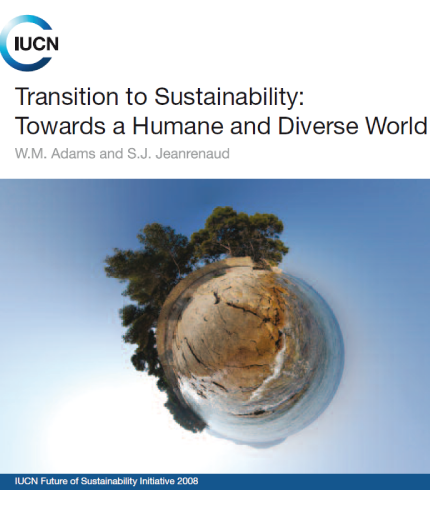Dear Aubrey,
Thanks for this.
I have now read the proposal, and am happy to confirm that I support it.
Good luck!
Best
Bill
Bill Adams MA MSc PhD Moran Professor of Conservation and Development
Fellow of Downing College
Works on the social drivers of the loss and protection of nature.
Re-conceiving growth: contraction and convergence
The dominant development model, based on the unlimited meeting of consumer wants leads inexorably to overconsumption. Yet the continued physical expansion in the global reach of commodity supply systems means that consumers in developed countries continue to perceive resource flows as bountiful, and develop no sense of limits to consumption. Whether as consumers or citizens, people in industrialized economies show no awareness that production systems are ecologically flawed or constrained.In order to achieve fair shares of the global resources available, theories of growth need to be transformed to theories of contraction and convergence, to balance the increases in energy and material use that are needed to raise living conditions among the poor against contractions among the wealthy and super-rich. There is a growing interest in ideas of 'degrowth' (de-croissance). Degrowth is a term created by radical critics of growth theory intended to make space for alternative projects as part of post-development politics. Degrowth is (like sustainability) an ethical concept of how the world needs to change. Proponents of contraction want 'to create integrated, selfsufficient and materially responsible societies in both the North and the South'.
Re-conceiving growth builds on longstanding arguments about the need for, and feasibility of, 'zero-growth', notably perhaps Herman Daly's work on 'steady-state economics'. Back in 1977, Daly's 'impossibility theorem pointed out that a high mass-consumption economy in the US style was impossible (at least for anything other than a short period) in a world of four billion people. Since then, lockin to progressivist growth economics has if anything deepened, and so too have the risks that sustainability thinking seeks to address. The idea of a contraction-based society poses a challenge: to find alternative models for the creation of human welfare from industry, technology and nature. Poor countries need to be able to industrialize and grow to meet the welfare needs of their people, but they need a way of doing this that avoids the world-busting models of past industrialization. Rich countries need to see ways forward that maintain quality of life, while shedding the habits and structures that damage the biosphere and corner an unfair share of the resources that are needed by the world's poor.
IUCN - Transition to Sustainability: Towards a Humane and Diverse World
S J Jeanrenaud W M Adams
A call for a new policy approach was identified by Professor Bill Adams of University of Cambridge as one of the main topics of conversation surrounding the upcoming Rio+20 conference. Some people have high hopes that the summit will address many of the major global issues and argue that the process is ‘honing in on a solution’. However, others see it as simply a ‘spiral of talk’. Prof. Adams put the upcoming conference in the context of 40 years since the publication of ‘Limits to Growth’ in 1972. Since then, he stated, we have made progress in some ways but are at a point in what he called ‘the Anthropocene’ where ‘the rates, scales, kinds, and combinations of changes occurring now are fundamentally different from those at any other time in history’ (quoted from Vistousek et al). Consequently, we need new policy approaches and innovative solutions which holistically address the needs of society, the economy and the environment. Prof. Adams argued that this will require a transformation of production and consumption to reduce resource demand and improve equity. This ‘contraction and convergence’ will be ‘profoundly difficult’ due to the challenge of persuading populations in both developed and developing to adjust their material aspirations. Prof. Adams concluded that the current situation is ‘an uncomfortable place to be’ but exciting too as important political figures are beginning to recognise that a change in lifestyles and consumption is necessary to address the ‘perfect storm’ of issues facing the world.
British Ecological Society




